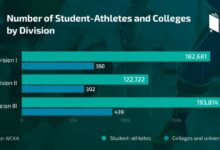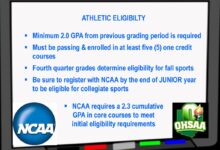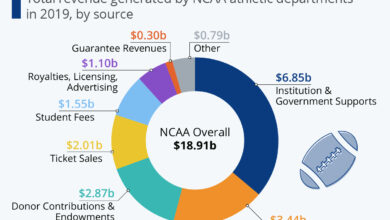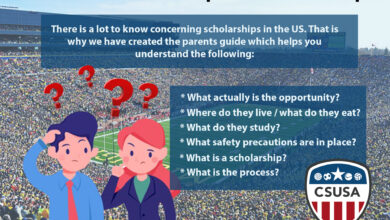How To Get An Athletic Scholarship For College: A Comprehensive Guide
Starting with How to Get an Athletic Scholarship for College, this guide will take you through essential steps and tips to secure a scholarship and pursue your sports career.
Exploring different athletic scholarships, eligibility criteria, and application processes can be daunting, but with the right guidance, you can navigate this path successfully.
Researching Athletic Scholarships
When researching athletic scholarships for college, it is crucial to understand the various types available, eligibility criteria, academic requirements, application process, and financial implications. Here, we delve into the key aspects of researching athletic scholarships to help student-athletes navigate this process effectively.
Types of Athletic Scholarships
- Scholarships based on athletic performance
- Full-ride scholarships covering tuition, room, and board
- Partial scholarships for specific sports
Eligibility Criteria
- Different colleges have varying GPA requirements
- Standardized test scores may be considered
- Demonstrated athletic ability through competitions
Importance of Academic Performance
Maintaining a strong academic record is crucial as many colleges require a minimum GPA for athletic scholarships. Academic performance can also impact a student-athlete’s eligibility for scholarships and their overall college experience.
Documents Required for Application
- Transcripts
- Letters of recommendation
- Athletic resume
- Standardized test scores
Successful Athletes with Scholarships
Athletes like Serena Williams, LeBron James, and Simone Biles have received athletic scholarships, which helped propel their careers to success. These scholarships have provided opportunities for athletes to excel in their sports.
Role of Coaches and Associations
Coaches and sports associations play a vital role in recommending student-athletes for scholarships. They can provide valuable insights into an athlete’s abilities and potential, which can strengthen their scholarship applications.
Rules and Regulations
- Student-athletes must maintain academic and athletic standards
- Compliance with NCAA or other sports governing bodies’ regulations
- Meeting practice and game requirements
Financial Implications
Receiving an athletic scholarship can cover tuition, room, and board, easing the financial burden on student-athletes and their families. However, additional expenses such as travel, equipment, and personal costs may still need to be considered.
Application Deadlines
It is essential to be aware of the application deadlines for different athletic scholarships and adhere to the submission process. Missing deadlines can jeopardize a student-athlete’s chance of securing a scholarship, so careful planning and organization are key.
Conducting Market Research for a New Product Launch
Market research is a crucial step in the process of launching a new product as it provides valuable insights into consumer preferences, market trends, and competitive landscape. By conducting thorough market research, businesses can make informed decisions that increase the chances of a successful product launch.
Methods and Techniques Used in Market Research
There are several methods and techniques used in market research to gather relevant data:
- Surveys: By collecting feedback from potential customers through surveys, businesses can understand consumer preferences and behavior.
- Focus Groups: Organizing focus groups allows businesses to delve deeper into consumer opinions and perceptions regarding the new product.
- Competitor Analysis: Studying competitors helps in identifying market gaps, potential threats, and areas for differentiation.
Key Metrics to Analyze During Market Research
Key metrics to analyze during market research include:
- Target Market Demographics: Understanding the characteristics, behaviors, and preferences of the target market.
- Consumer Preferences: Identifying what features, benefits, or values consumers prioritize in a product.
- Market Trends: Keeping abreast of industry trends, technological advancements, and shifting consumer demands.
Analyzing Data and Making Informed Decisions
It is essential to analyze and interpret the data gathered from market research to make informed business decisions. By identifying patterns, trends, and insights, businesses can adapt their strategies to meet consumer needs effectively.
Developing a Successful Marketing Strategy
Using the findings from market research, businesses can develop a successful marketing strategy for a new product launch. This involves crafting compelling messages, selecting the right channels, and positioning the product effectively in the market to attract and retain customers.
Building a Strong Athletic Profile
Creating a standout athletic profile is crucial for catching the eye of college recruiters. Here are some tips on how to build an impressive athletic resume and showcase your skills effectively.
Tips for Creating an Impressive Athletic Resume
- Include key elements such as academic achievements, sports awards, leadership roles, and relevant statistics.
- Highlight your strengths and accomplishments in a concise and organized manner.
- Use action verbs and specific examples to demonstrate your skills and contributions to the team.
Significance of Highlight Videos and Game Footage
Highlight videos and game footage are essential for recruiters to assess your performance. They provide a visual representation of your skills and abilities, giving recruiters a better understanding of your capabilities.
Importance of Attending Sports Camps and Showcases
Participating in sports camps and showcases can significantly increase your exposure to college recruiters. These events offer networking opportunities and allow you to showcase your talents in a competitive environment.
Best Practices for Organizing and Formatting an Athletic Resume
- Keep the resume concise and focused, highlighting the most relevant information.
- Use a clean and professional format with easy-to-read fonts and headings.
- Tailor the resume to specific colleges or programs to demonstrate your interest and fit.
Effective Highlight Videos and Game Footage
Effective highlight videos should showcase your best plays, skills, and overall performance. They should be well-edited and highlight your strengths as an athlete.
Benefits of Attending Sports Camps and Showcases
- Opportunities to compete against top athletes and gain exposure to college recruiters.
- Receive coaching and feedback from experienced professionals to improve your skills.
- Networking with coaches, athletes, and scouts to expand your connections in the sports world.
Making the Most of Sports Camps and Showcases
- Come prepared with a positive attitude, strong work ethic, and willingness to learn.
- Engage with coaches and recruiters, showcasing your skills and enthusiasm for the sport.
- Follow up with coaches and recruiters after the event to express your continued interest and dedication.
Reaching Out to College Coaches
Reaching out to college coaches is a crucial step in the recruitment process for getting an athletic scholarship. It involves effectively communicating your interest and abilities to attract the attention of coaches and potentially secure a spot on their team.
Contacting College Coaches
When reaching out to college coaches, it’s important to personalize your messages and demonstrate genuine interest in their program. Start by researching the team and the coach to show that you are serious about joining their team. Make sure to highlight your athletic achievements, academic performance, and why you would be a valuable addition to their roster.
- Send personalized emails to coaches expressing your interest in their program.
- Attach your athletic resume, highlight reels, and any relevant stats or accolades.
- Follow up with coaches after sending your initial email to keep the lines of communication open.
- Attend college recruitment events or camps where you can interact with coaches in person.
Role of Unofficial and Official Visits
Both unofficial and official visits play a significant role in the recruitment process. Unofficial visits allow you to visit the campus, meet with coaches, and get a feel for the program without the school covering your expenses. On the other hand, official visits are fully funded by the school and provide an opportunity to experience the team’s dynamics, facilities, and campus life firsthand.
Building a strong relationship with college coaches through effective communication and showcasing your skills can increase your chances of receiving an athletic scholarship.
Maintaining Academic Excellence
Maintaining a high level of academic performance is crucial when pursuing an athletic scholarship for college. Balancing sports and academics requires careful planning and dedication to meet scholarship requirements.
Strategies for Balancing Academics and Sports
- Create a study schedule: Allocate specific time slots for studying each day to ensure you stay on top of your academic responsibilities.
- Prioritize tasks: Identify high-priority assignments and exams to focus on while managing your sports commitments.
- Utilize study breaks: Use breaks between practices or games to review notes, complete assignments, or study for upcoming tests.
- Communicate with teachers: Inform your teachers about your athletic schedule so they can provide support and accommodate any missed classes or assignments.
Impact of GPA and Standardized Test Scores
Maintaining a strong GPA and performing well on standardized tests such as the SAT or ACT can significantly impact your chances of securing an athletic scholarship. Coaches and recruiters often consider academic achievements alongside athletic abilities when awarding scholarships.
Tips for Staying Motivated and Focused
- Set academic goals: Establish clear academic goals and track your progress to stay motivated throughout the season.
- Reward yourself: Celebrate academic achievements, whether big or small, to maintain a positive mindset and drive towards success.
- Seek support: Surround yourself with a supportive network of teachers, teammates, and family members who can encourage you to excel both academically and athletically.
Showcasing Leadership and Teamwork Skills
Leadership and teamwork are essential qualities that can greatly impact your chances of securing an athletic scholarship for college. Demonstrating these skills both on and off the field can make you stand out to scholarship committees and college coaches.
Demonstrating Leadership Skills
- Show initiative by volunteering to lead team warm-ups, drills, or team meetings.
- Lead by example by always giving your best effort during practices and games.
- Take on responsibilities such as organizing team events or mentoring younger players.
Collaborating Effectively with Teammates
- Communicate openly and respectfully with your teammates to build trust and cohesion.
- Recognize and appreciate the strengths of each team member to maximize teamwork performance.
- Encourage teamwork by setting common goals and working together to achieve them.
Resolving Conflicts and Fostering Positive Team Dynamics
- Address conflicts promptly and constructively to maintain a positive team environment.
- Seek input from all team members to find solutions that benefit the team as a whole.
- Lead team-building activities or bonding exercises to strengthen relationships and team unity.
Mentoring and Supporting Teammates
- Offer guidance and support to teammates who may be struggling or in need of assistance.
- Lead by encouraging a culture of inclusivity and support within the team.
- Show empathy and understanding towards teammates to build strong relationships and foster teamwork.
Seeking Guidance from High School Counselors
High school counselors play a crucial role in the athletic scholarship application process by providing students with valuable guidance and support. They have the expertise to help students navigate the complex world of college athletics and identify suitable scholarship opportunities.
Role of High School Counselors
High school counselors can assist students in creating a strategic plan to pursue athletic scholarships. They can help students understand the requirements, deadlines, and application processes for different scholarships. Counselors also provide valuable advice on how to showcase athletic achievements and academic excellence effectively.
Identifying Suitable Scholarship Opportunities
High school counselors have access to resources and information about various scholarship opportunities. They can help students narrow down their options based on their athletic abilities, academic goals, and personal preferences. Counselors can also assist in researching scholarship programs offered by specific colleges and universities.
Leveraging Counselors’ Expertise
Students can benefit from working closely with high school counselors to develop a strong scholarship application. Counselors can provide feedback on application materials, offer tips on writing compelling essays, and assist in securing letters of recommendation. By leveraging the expertise of counselors, students can increase their chances of success in securing an athletic scholarship.
Exploring Alternative Scholarship Sources
When looking for athletic scholarships, it’s essential to explore alternative sources beyond traditional avenues. These non-traditional sources can offer unique opportunities that may not be widely known. Here are some tips to help you uncover these alternative scholarship sources:
Local Organizations and Foundations
- Research local organizations, community groups, and foundations in your area that may offer scholarships for student-athletes.
- Check with sports clubs, gyms, and recreational centers for potential scholarship opportunities.
- Reach out to local businesses that sponsor sports teams or events to inquire about scholarship programs.
Niche Scholarships
- Explore niche scholarships that cater to specific sports or criteria, such as women’s sports, minority athletes, or unique athletic talents.
- Look for scholarships that focus on academic performance, community service, or leadership qualities in addition to athletic excellence.
- Consider applying to lesser-known scholarship programs that align with your personal interests and goals.
Networking within Sports Communities
- Connect with coaches, athletes, and sports enthusiasts in your specific sports community to learn about specialized scholarship opportunities.
- Attend sports events, workshops, and networking sessions to expand your connections and discover hidden scholarship programs.
- Engage with alumni associations, sports clubs, and online forums dedicated to your sport to stay updated on scholarship opportunities.
Creating a Personalized Scholarship Search Strategy
- Assess your athletic strengths, achievements, and personal goals to tailor your scholarship search strategy accordingly.
- Utilize online scholarship search engines, databases, and resources to identify potential scholarship sources that match your profile.
- Organize your scholarship search by setting goals, deadlines, and priorities based on your individual needs and preferences.
Successful Examples of Lesser-Known Scholarships
- Explore success stories of student-athletes who secured scholarships from alternative sources to gain inspiration and insights for your own scholarship search.
- Learn from the experiences of others who navigated the process of applying for and receiving scholarships from lesser-known organizations or foundations.
- Seek guidance from mentors, coaches, or advisors who can provide support and advice on pursuing alternative scholarship opportunities.
Understanding Scholarship Renewal Requirements
Maintaining an athletic scholarship in college requires meeting specific criteria each year to ensure continued financial support. Student-athletes must understand the renewal process to secure funding for their education.
Criteria for Renewing Athletic Scholarships
- Student-athletes must maintain a minimum GPA to be eligible for scholarship renewal.
- Continued participation in the college sports team is often a requirement for scholarship renewal.
- Athletes may need to meet specific performance standards set by the coaching staff to retain their scholarships.
- Compliance with team rules, codes of conduct, and academic progress are essential for renewal.
Navigating the Renewal Process
- Stay in communication with the college coaches to understand the expectations for scholarship renewal.
- Create a timeline to track deadlines for renewal applications and required documents.
- Seek guidance from academic advisors and coaches to address any challenges in meeting renewal criteria.
Consequences of Not Meeting Renewal Criteria
- Failure to meet renewal requirements can result in loss of scholarship funding.
- Students may need to explore alternative financial aid options if scholarships are not renewed.
- Being proactive in addressing renewal criteria can help avoid scholarship loss.
Comparing Renewal Requirements
- Academic scholarships often focus on maintaining a specific GPA, while athletic scholarships require performance standards in sports.
- Athletic scholarships may have additional requirements related to team participation and behavior.
Tips for Meeting Renewal Standards
- Balance academic and athletic responsibilities to ensure eligibility for scholarship renewal.
- Seek tutoring or academic support if needed to improve grades and meet GPA requirements.
- Stay dedicated to training and improving athletic skills to meet performance standards.
Successful Strategies for Scholarship Renewals
- Develop a strong relationship with coaches and demonstrate commitment to the team and sport.
- Participate in leadership roles within the team to showcase teamwork and dedication.
- Seek feedback from coaches on areas of improvement and work towards enhancing skills.
Considering Walk-On Opportunities
When it comes to college sports, walk-on opportunities provide a unique pathway for student-athletes to join a team without a scholarship. This option allows individuals to showcase their skills and dedication to the sport, with the potential to earn a spot on the team roster.
Benefits and Challenges of Pursuing a Walk-On Position
- Benefits:
- Opportunity to prove oneself and earn a spot on the team
- Potential for growth and development in a competitive environment
- Chance to be part of a collegiate sports program
- Challenges:
- Lack of financial aid or scholarship support
- Competing against scholarship athletes for playing time
- Balancing time between athletics and academics without a scholarship
Approaching Coaches and Showcasing Skills as a Walk-On Candidate
When approaching coaches as a walk-on candidate, it’s essential to demonstrate your passion, work ethic, and commitment to the team. Showcasing your skills through tryouts, practices, and games can help coaches see your potential and dedication to the sport.
Successful Walk-On Stories in College Sports
There are numerous success stories of walk-on athletes who have earned starting positions, scholarships, and recognition for their hard work and dedication. These stories serve as inspiration for aspiring walk-on athletes and highlight the possibilities that come with perseverance and determination.
Qualities Coaches Look for in Walk-On Candidates
- Determination and work ethic
- Coachability and willingness to learn
- Positive attitude and teamwork skills
- Physical fitness and skills relevant to the sport
Preparing for a Walk-On Tryout
Preparing physically and mentally for a walk-on tryout involves consistent training, honing your skills, staying focused, and maintaining a positive mindset. It’s crucial to be in top physical condition and mentally prepared to showcase your abilities during the tryout.
Differences Between Scholarship Athletes and Walk-On Athletes
- Scholarship Athletes:
- Receive financial aid for tuition and expenses
- Have higher expectations and commitments to the team
- May have guaranteed playing time based on the scholarship
- Walk-On Athletes:
- Do not receive financial aid for athletics
- Need to earn their spot on the team through tryouts and performance
- May have limited playing time initially
Balancing Academics and Athletics as a Walk-On Athlete
As a walk-on athlete, balancing academics and athletics requires strong time management skills, discipline, and prioritization. It’s essential to stay organized, communicate with professors and coaches, and seek support when needed to excel both on the field and in the classroom.
Recruitment Process for Walk-On Athletes Across Different Sports
The recruitment process for walk-on athletes varies across different sports, with some programs holding open tryouts, while others require a more formal evaluation process. Researching the specific requirements and expectations for walk-on candidates in your sport of interest can help you prepare effectively for the recruitment process.
Leveraging Social Media for Exposure
Social media plays a crucial role in helping student-athletes showcase their talents to college recruiters. Platforms like Instagram, Twitter, and YouTube provide a powerful medium for athletes to highlight their skills, achievements, and dedication to their sport.
Creating a Professional Social Media Presence
- Ensure your profiles are public and easily accessible to recruiters.
- Post regularly about your training sessions, games, and achievements to keep your audience engaged.
- Use high-quality photos and videos to showcase your skills effectively.
- Interact with followers and respond to comments to build a strong online presence.
- Avoid controversial or inappropriate content that could harm your chances of securing a scholarship.
Success Stories of Student-Athletes
- John Smith, a high school basketball player, created YouTube videos showcasing his game highlights and skills. His videos went viral, catching the attention of college coaches who eventually offered him a scholarship.
- Emily Johnson, a track and field athlete, used Instagram to document her training journey and share motivational posts. Her active presence on social media helped her connect with coaches and secure a scholarship at her dream college.
Understanding the Financial Aid Process
When it comes to securing an athletic scholarship for college, it is essential to understand how it impacts your overall financial aid package. Athletic scholarships play a crucial role in financing your education, but they interact with other scholarships and financial aid options in various ways. Navigating this process requires careful consideration and planning to maximize your financial support while pursuing your athletic dreams.
Interaction Between Athletic Scholarships and Financial Aid
Understanding how athletic scholarships interact with other forms of financial aid is key to making informed decisions. Here are some important points to consider:
- Athletic scholarships are considered part of your overall financial aid package, which may also include academic scholarships, grants, and loans.
- When you receive an athletic scholarship, it may impact the amount of need-based financial aid you are eligible for, such as federal grants or work-study programs.
- It’s crucial to communicate with the financial aid office to ensure that your athletic scholarship is coordinated effectively with other forms of financial aid to maximize your financial support.
Tips for Navigating the Financial Aid Process with Athletic Scholarships
Here are some tips to help you navigate the financial aid process while considering athletic scholarships:
- Start early and research all available financial aid options, including athletic scholarships, academic scholarships, and grants.
- Work closely with the financial aid office at your college to understand how athletic scholarships will impact your overall financial aid package.
- Be proactive in seeking out additional sources of funding, such as private scholarships or outside grants, to supplement your athletic scholarship.
- Stay informed about the renewal requirements for your athletic scholarship to ensure you maintain eligibility for financial aid throughout your college career.
- Consider seeking guidance from a financial aid advisor or counselor to help you navigate the complexities of the financial aid process.
Preparing for Scholarship Interviews
When it comes to securing an athletic scholarship for college, being prepared for scholarship interviews is crucial. These interviews provide an opportunity to showcase not only your athletic abilities but also your academic achievements and personal qualities. To help you succeed in scholarship interviews, here are some key points to keep in mind:
Common Interview Questions
- Can you tell us about your athletic accomplishments and how you have contributed to your team?
- How do you balance your athletic commitments with your academic responsibilities?
- Describe a time when you faced adversity in sports and how you overcame it.
- What are your long-term goals, both in your sport and academically?
Tips for Effective Preparation and Presentation
- Research the college and its athletic program to show your interest and knowledge during the interview.
- Practice articulating your achievements and goals clearly and confidently.
- Show enthusiasm for both your sport and academics to demonstrate your well-rounded nature.
- Be prepared to discuss how you can contribute to the college community beyond athletics.
Importance of Showcasing Athletic and Academic Achievements
During scholarship interviews, it is essential to highlight not only your athletic skills but also your academic achievements. Colleges seek student-athletes who can excel both on the field and in the classroom. By showcasing your academic accomplishments, you demonstrate your dedication, discipline, and ability to succeed in all areas of your life. This well-rounded approach can set you apart from other candidates and strengthen your case for receiving a scholarship.
Navigating the NCAA Clearinghouse Process
Navigating the NCAA Clearinghouse Process is crucial for student-athletes looking to secure athletic scholarships for college. The NCAA Clearinghouse serves as a certification process to ensure student-athletes meet academic and amateurism requirements for participation in college athletics.
Purpose and Requirements of NCAA Clearinghouse
The NCAA Clearinghouse verifies the academic eligibility and amateur status of student-athletes seeking to compete at the collegiate level. To register with the NCAA Clearinghouse, student-athletes must have completed a certain number of core courses, maintained a minimum GPA, and achieved a qualifying score on standardized tests like the SAT or ACT.
Steps for Registering with NCAA Clearinghouse
- Visit the NCAA Clearinghouse website and create an account.
- Complete the registration form with personal, academic, and athletic information.
- Submit transcripts, test scores, and any necessary documentation to verify eligibility.
- Pay the registration fee and ensure all required materials are submitted for review.
Significance of NCAA Clearinghouse Eligibility
Being deemed eligible by the NCAA Clearinghouse is a vital step in the process of securing an athletic scholarship. College coaches rely on Clearinghouse certification to confirm a student-athlete’s academic standing and ensure compliance with NCAA rules and regulations.
Examples of Documents for NCAA Clearinghouse Registration
Transcripts, standardized test scores, proof of amateurism, and contact information for high school counselors or coaches.
Comparison Table: NCAA Division I vs. Division II Eligibility
| NCAA Division | Core Course Requirements | Minimum GPA | Standardized Test Score |
|---|---|---|---|
| Division I | 16 core courses | 2.3 GPA | SAT 1000 or ACT 86 |
| Division II | 16 core courses | 2.2 GPA | SAT 900 or ACT 76 |
Timeline for NCAA Clearinghouse Application
Student-athletes should begin the NCAA Clearinghouse registration process during their junior year of high school. This allows sufficient time for verification of eligibility and ensures a smooth transition to college athletics.
Checking Eligibility Status with NCAA Clearinghouse
After submitting all required documents and information, student-athletes can log in to their NCAA Clearinghouse account to track the status of their eligibility review. This provides transparency and allows athletes to address any issues promptly.
Seeking Professional Guidance
Seeking assistance from athletic recruiting services or agencies can greatly benefit student-athletes in their quest for securing athletic scholarships. These professionals have the expertise and connections to help navigate the complex recruiting process, identify suitable scholarship opportunities, and provide valuable guidance throughout the journey.
Choosing Reputable Recruiting Services
- Research different recruiting services: Look for well-established organizations with a track record of success in helping student-athletes secure scholarships.
- Read reviews and testimonials: Check online reviews and ask for recommendations from coaches, athletes, and other trusted sources to gauge the reputation of the recruiting service.
- Verify credentials: Ensure that the recruiting service is legitimate and affiliated with recognized sports organizations to avoid scams or fraudulent practices.
Optimizing Scholarship Opportunities
- Personalized guidance: Professional recruiting services can provide personalized strategies and advice tailored to the individual athlete’s goals and strengths.
- Networking opportunities: These services often have extensive networks with college coaches and recruiters, increasing exposure and access to scholarship opportunities.
- Maximizing visibility: Recruiting services can help athletes showcase their skills effectively through highlight videos, player profiles, and targeted communication with coaches.
Concluding Remarks
As we conclude this guide on securing athletic scholarships for college, remember that dedication, hard work, and strategic planning are key to achieving your goals in sports and academics.









